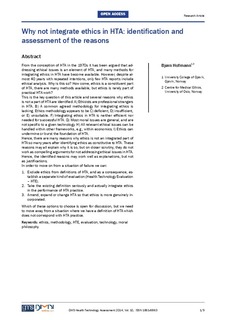| dc.description.abstract | From the conception of HTA in the 1970s it has been argued that addressing ethical issues is an element of HTA, and many methods for integrating ethics in HTA have become available. However, despite almost 40 years with repeated intentions, only few HTA reports include ethical analysis. Why is this so? How come, ethics is a constituent part of HTA, there are many methods available, but ethics is rarely part of practical HTA work?
This is the key question of this article and several reasons why ethics is not a part of HTA are identified. A) Ethicists are professional strangers in HTA. B) A common agreed methodology for integrating ethics is lacking. Ethics methodology appears to be C) deficient, D) insufficient, or E) unsuitable. F) Integrating ethics in HTA is neither efficient nor needed for successful HTA. G) Most moral issues are general, and are not specific to a given technology. H) All relevant ethical issues can be handled within other frameworks, e.g., within economics. I) Ethics can undermine or burst the foundation of HTA.
Hence, there are many reasons why ethics is not an integrated part of HTA so many years after identifying ethics as constitutive to HTA. These reasons may all explain why it is so, but on closer scrutiny, they do not work as compelling arguments for not addressing ethical issues in HTA. Hence, the identified reasons may work well as explanations, but not as justifications.
In order to move on from a situation of failure we can:
1.
Exclude ethics from definitions of HTA, and as a consequence, establish a separate kind of evaluation (Health Technology Evaluation – HTE).
2.
Take the existing definition seriously and actually integrate ethics in the performance of HTA practice.
3.
Amend, expand or change HTA so that ethics is more genuinely incorporated.
Which of these options to choose is open for discussion, but we need to move away from a situation where we have a definition of HTA which does not correspond with HTA practice. | nb_NO |

